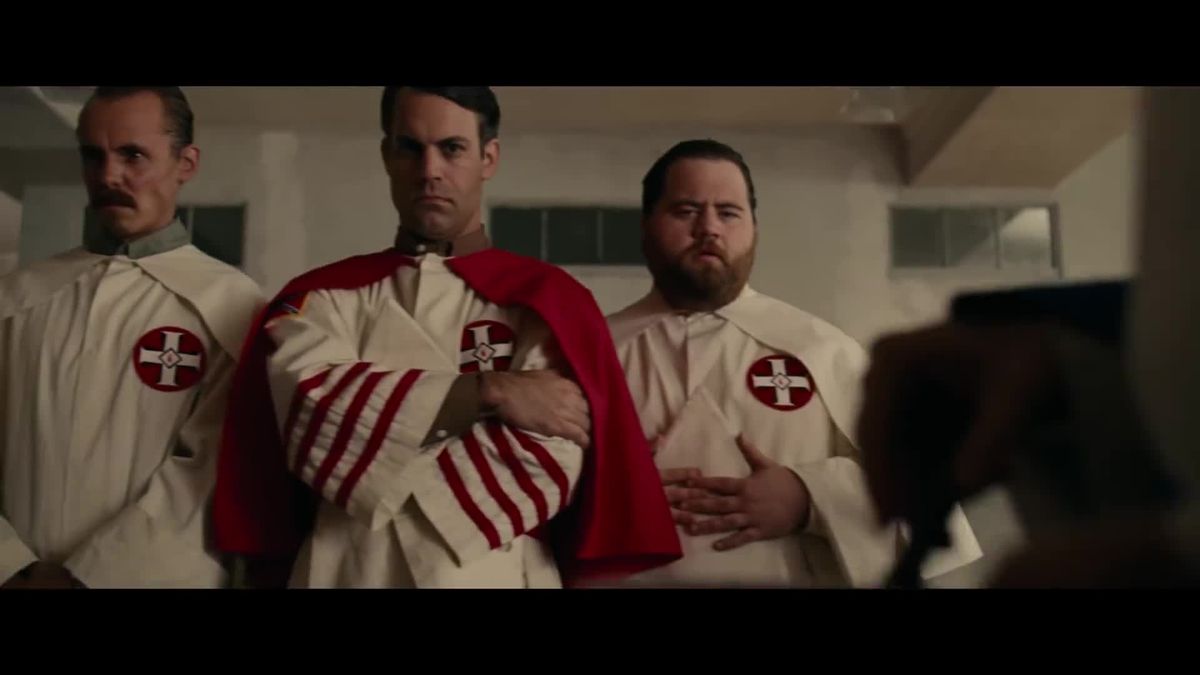Ron Stallworth wants to make one thing clear: when he infiltrated the Ku Klux Klan as a black police detective in 1978, it was simply "just another assignment" during his time in the Colorado Springs Police Department.
"I didn't have any special thoughts about it as it took place,” Stallworth tells Esquire from his home in El Paso, Texas. “It was just a job I did at that particular point in time. When that job ended, I moved onto something else. It happened by circumstance."
Stallworth worked undercover for around 30 years, but it was this particular case that captured the attention of the world four decades later. Stallworth's story first came to light when the 65-year-old wrote about it in his 2014 autobiography, Black Klansman: Race, Hate and the Undercover Investigation of a Lifetime.
This summer, Spike Lee's big screen adaptation of the story became one of 2018's must-see films. BlacKkKlansman received critical acclaim (The New York Times called it Lee's "best nondocumentary feature in more than a decade and one of his greatest"). The movie also won Lee the Grand Prix prize—and a standing ovation—at Cannes Film Festival.
Stallworth's character was portrayed by John David Washington (yes, the son of Denzel). Adam Driver, Alec Baldwin and Corey Hawkins (Straight Outta Compton) also starred, and there was breakout role from American actress Laura Harrier. With this line-up, it was always going to be a film that captured the masses – and one that couldn't be more relevant in the present political climate.
Buy Now on Amazon from £5.62.
The KKK have perpetrated innumerable acts of domestic terrorism against minorities over the past two centuries in the US. The group is often defined by three "waves" in which they had the highest membership and were most violent. The first movement came in the 1860s, when it was founded shortly after the end of the Civil War, followed by a resurgence around 1915. The third wave hit in the 1950s and 1960s during the Civil Eights Era. According to the Anti-Defamation League, as of 2017, there are still 40 active Klan groups in the US.
Stallworth's investigation came about around a decade after the third wave, which saw Klan members commit heinous acts, such as the 1963 bombing of a baptist church in Birmingham, Alabama, which killed four black schoolgirls.
It was October, 1978, when Stallworth—at 25 years old, having joined the police force at 19 as the only black man in the department—was flicking through a local paper. He noticed a classified advert for the Ku Klux Klan, encouraging people who wanted "further information" to get in touch.
Stallworth followed the advert by writing a letter posing as a white racist who wanted to join the Klan. He sent it to the PO Box address listed without discussing it with his colleagues—and he didn't think through what might happen next. He even signed the note with his real name, something undercover officers usually avoid doing.
"I signed it with my real name, gave them the undercover phone line, mailed it and forgot about it until two weeks later when I got a call from the local organiser," he says.
Stallworth realised that to purse the investigation further he would need a white colleague to pretend to be him to meet with Klan members in person, so he enlisted his colleague, who is known as 'Chuck' in the book and played by Driver in the film. All the while, Stallworth kept up the act over the phone. He even called David Duke, the notorious leader or "Grand Wizard" of the hate group, to confirm his membership. That contact led to weekly calls with Duke.
Stallworth successfully acquired Klan membership two months after first making contact. On the back of the membership card were six conduct codes. Stallworth found the fifth code particularly amusing: "To never discuss any Klan affairs with any plain clothes officers on a state, local or national level".
Over the eight months of the investigation, using the inside information he received, the force prevented three cross-burning ceremonies and identified KKK members who had top security clearance at the North American Aerospace Defense Commande. He also helped to trace links between further white supremacist groups in Colorado and learned of unfullfilled plans to bomb gay night clubs and steal automatic weapons from an army base.
Despite the case starting out as "just another assignment", Stallworth now says the investigation is one of his proudest career moments: "It always has been. The fact that we were able to pull this con-job off for seven and a half months? I've always been proud of that."
Though Stallworth's operation was a success, white supremacist groups are still at large and continue to pose a threat. The biggest recent evidence being the 2017 'Unite the Right' rally in Charlottesville, Virginia—footage of which the film poignantly climaxes with. The protest made international news when white supremacist groups angrily marched through the town with torches protesting against the removal of confederate monuments, where they were met with anti-fascist groups counter-marching. On 12 August, a driver ploughed into the anti-fascist group killing Heather Heyer, a 32-year-old activist. One of the final scenes of BlacKkKlansman is dedicated to Heyer.
White supremacy was forced into the discourse of daily political life in the US during the 2016 presidential campaign when Republican nominee Trump went back and forth in denouncing David Duke (who was at Charlottesville) for his support of his candidacy. On election day, the former KKK leader openly celebrated his win, describing the night as one of the most "exciting" of his life. "Make no mistake" he wrote on Twitter. "Our people have played a HUGE role in electing Trump."
And after Charlottesville, the president insisted there was both violence and "very fine people" on both sides: "You had a group on one side that was bad, and you had a group on the other side that was also very violent, and nobody wants to say that, but I’ll say that right now. You had a group on the other side that came charging in without a permit, and they were very, very violent," he said at a press conference. He later backtracked on these comments following a national outcry.
"My story is about the link between white supremacists across the ages," Stallworth says. "Spike begins it at the confederacy in the 1860s... then brings it forward to David Duke then to Charlottesville to Donald Trump and concludes with David Duke. He weaves that historical thread and America's white supremacist history."
Stallworth believes that thread of racism in the US will persist as long as Trump is in office.
"He is a complete and total disgrace to this office, the country, the world," Stallworth says firmly. "He is in many respects their [white supremacist groups] ideological leader who gives them a wink and a nod to go out and do the things they are doing. The wink and nod is more of a bullhorn. As long as he's in office and has their back, they are going to be more prevalent in our lives."
Stallworth hopes his experience and the movie start an honest conversation about racism.
"It's part of our national DNA, we should be able to have an honest discussion with one another about it to try and seek solutions," he says. "Instead, we go around trying to avoid the subject."
When making the film, Lee invited Stallworth and his wife, Patsy, to the initial read-through of the production with the cast where he answered questions, gave advice and swapped numbers with some of the cast to answer further questions they had before finally getting to see the finished product himself.
"It's a very surreal moment—to sit in a theatre with my wife and see events that I lived recreated on the big screen and hear words I wrote four years ago coming out of the mouths of the actors," he says. "It's almost like an out of body experience, it's a very special moment."
Black Klansman by Ron Stallworth (Arrow, £7.99) is out now. Spike Lee’s BlacKkKlansman film is now in cinemas.















